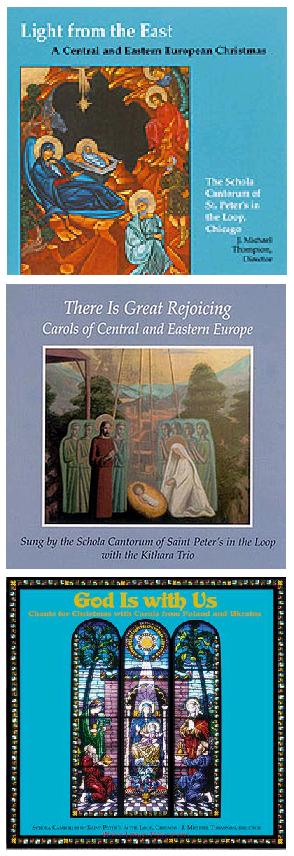During the years I spent in Ukraine, in eastern Europe, there was no time more joyful than the Christmass season. My family and I fell in love with the eastern European carols that our Ukrainian friends sang at that special time of the year, with such devotion. These marvelous carols are largely unknown to Christians in the west, whose Christmass carol repertoire is based largely on what has been passed down to us from English and German sources. But this need not be!
Over the years, the Schola Cantorum of St. Peter's in the Loop (now known as the Schola Cantorum of St. Peter the Apostle) has issued some marvelous Christmass CDs on which they sing - in English translation! - many of these beautiful eastern European carols. I highly recommend these recordings, not only because of the charming quality of the music and the theological dignity of the lyrics, but also because of the superb technical quality of the performance and the recording.
The commercial interests all around us have already begun their selling frenzy in earnest. But I am countering these secular intrusions into my own heart and mind by playing the three Schola Cantorum Christmass CDs that I own whenever I can: at home, at work, and in the car.
There is Great Rejoicing (1993) was the first album in this genre that the Schola Cantorum produced. It is good, but my personal favorite is Light from the East (1999), which includes several hymns from the Slovak Lutheran tradition (translated by Jaroslav Vajda and sung to settings by Carl Schalk). The third CD in my collection is God is With Us (1998), which includes more of the distinctly Ukrainian carols that we used to sing in Ukraine.
I suppose there is a certain sentimentalism attached to this music for me, not only because I lived for eight years in the part of the world whence these carols originated, but also because my maternal ancestors lived there in centuries past (Lutherans in the "Little Carpathian" region of western Slovakia, and Greek Catholics and Reformed in the [big] "Carpathian" region of eastern Slovakia). But those who have no personal history or family roots in eastern Europe would no doubt also enjoy these recordings, as they testify to the great wonder of God's incarnation for our salvation, and to the salvation that is ours through Christ, the Babe of Bethlehem.

Khrystos narodivsya!




